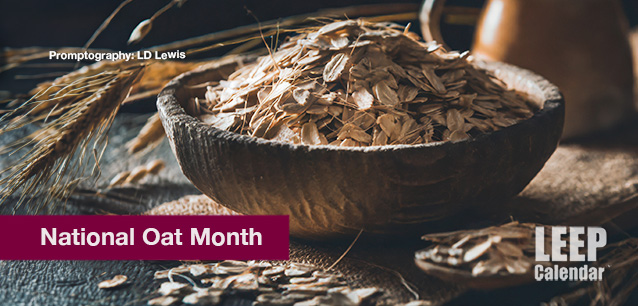 AD
AD
Today is: January 08
Scroll to explore events active on this date.
LEEP INK FEATURES

August? Absolutely!
In August, we live through the Dog Days of Summer. It's hot and often humid, and those who can leave for better climates do. Down south, winter is in full force. August is also known as "the ...

In The Heat of July: July 2025 Events
Is it hot enough (or cold enough if you're below the equator) for you yet? There is actually a day for that! Like every month, I pick a diverse collection of events you may or may not know about. This ...

May Blooms: Events in May 2025
Along with October, May is one of the most densely packed months of the year. It's before the summer humidity and the last whole month of the school year. The weather is warming in t...
About Oats Month
Retail , United States
Ends: Jan 31, 2025
DESCRIPTION:
January is Oat Month.
Oats, a grain known for its nutritional value and versatility, have a long history that intertwines with the development of human agriculture. Originating in the Fertile Crescent, the cradle of early civilizations in the Middle East, oats were initially considered a weed that grew alongside more dominant crops like wheat and barley. However, their resilience and adaptability in various climates and soils gradually led to their recognition as a valuable food source.
The journey of oats from a humble weed to a staple grain is a testament to human agricultural evolution. By ancient Rome, oats were recognized for their nutritional benefits and as animal feed. It was in the cooler climates of Europe, particularly in Scotland, Scandinavia, and Germany, where oats truly flourished as a human food source. The ability of oats to grow in poor soil conditions where other grains struggled made them especially important in these regions.
In terms of culinary use, oats are incredibly versatile. They are commonly associated with oatmeal or porridge, a traditional breakfast dish. Oats are also a key ingredient in granola, muesli, and various baked goods, including the universally loved oatmeal cookies. The grain's natural, mild sweetness and chewy texture make it a popular addition to bread, pancakes, and snack bars.
Oats have gained renewed interest in recent years due to their health benefits. Rich in dietary fiber, particularly beta-glucan, they are known to aid in lowering cholesterol levels and maintaining blood sugar control. Oats are also a good source of protein, vitamins, and minerals. This nutritional profile, combined with the fact that oats are naturally gluten-free, makes them a staple in health-conscious diets, including those of individuals with celiac disease or gluten sensitivities.
The history of oats is about their role in human nutrition, adaptation, and survival. From their origins as a secondary crop to their current status as a superfood, oats have been integral to various cultures and diets. Their journey reflects societies' changing dietary needs and agricultural practices over millennia, and their popularity today is a testament to their enduring value as a nutritious and versatile grain.
VIDEOS
SUPPORTING DOCUMENTS
Currently, this event does not have supporting documents.
ADDITIONAL IMAGES
Currently, this event does not have supporting images.
Where would you like to go now?
 AD
AD


/footer-logo.svg)
